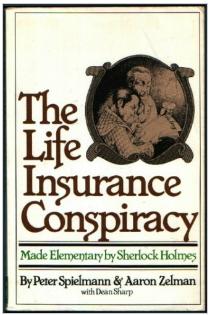|
The American Life Insurance industry has grown hugely wealthy in failing to perform its socially required fundamental purpose.
Instead of providing a way for breadwinners to economically provide families with income lost as a result of an untimely death, the companies cleverly construct and market contracts (policies) designed to transfer family assets, typically on a monthly basis, to themselves.
They avoid any discussion of the difference among savings accounts, financial investments, and insurance policies.
This would be absurd if practiced by any other insurer. Let's take the insurer of the family automobile for example. After shopping for the best price, a family might receive a monthly car insurance quotation of $195 a month. Just as the family is about to have coverage put in place, a helpful and well-trained salesperson offers what is claimed to be a "better option" for the family. Here is how it might be presented:
Your excellent driving record indicates that the money you will be spending over the coming year on insurance protection, $2,340, will be completely gone. Entirely. And so forth, year after year. Let me just tell you about our great $260 "cash value" plan. Here is how it works: You will have all the coverage provided by the cheaper $195 plan but a part of your monthly premium will be yours to keep. Year by year this will grow into a hefty sum that is yours to manage in case you need some money for an emergency, a better vacation, or a more confortable retirement. Here is a graph illustrating what this would be worth to your family.
To continue relating this to a cash-value policy, the honest car insurance salesman would be obliged to point out that in the event of an at-fault accident the claim would be paid from the insured's cash-value account. Of course, that fact alone would kill the sale. That is why this detail is cleverly avoided in the sale of cash-value life insurance.
Naturally, no automobile insurance company is going to pull a stunt like that. The difference in presenting a cash value life-insurance proposal is that, unlike that of the non cash-value $195 auto policy, the cost of the contract's insurance portion is not disclosed!
For the subject of cost to become an issue, the conversation must switch to what the insurance salesman has been wrongly trained to describe as an entirely different class of policies, that of term insurance, with no financial value to living policyholders, and that are described, in sales training, as being temporary coverage as opposed to permanent coverage of a cash value plan.
Life-insurance salespersons avoid mentioning (and may not, themselves, realize) that in a cash-value policy the death claim relies primarily on the insureds cash-value "savings" before invoking the insurance part of the policy (the hidden term insurance portion). In later years this takes the company off the hook as the policyholders "savings" increasingly grow to equal the policy's "face value" (the death claim).
The sale of investment, or "savings plan" cash-value life insurance is simply a huge con-job that prospects wishing to protect their families fall for and never grasp or they would send the person selling it away promptly. I found this truth well stated by Venita Van Caspel when she wrote about the industry's funny banking rules.
That is true for all life-insurance policies other than pure (term) insurance. The price of actual life-insurance is determined from a mortality table and underwriting. Companies add an amount to cover their marketing and other business costs, including hefty sales commissions to assure a huge sales force of financially ambitious men and women. They then add company profit. This is not rocket science.
THE SOLUTION: Buy only TERM LIFE-INSURANCE.
Next: The Cost Nobody Claims |


